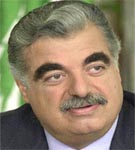Seniora: Hariri tribunal will end impunity in Lebanon
 Beirut - The UN court trying the suspects in the 2005 assassination of former Lebanese Premier Rafik al-Hariri will be a turning point for Lebanon to end political killings, Lebanese Prime Minister Fouad Seniora told Deutsche Presse-Agentur, dpa.
Beirut - The UN court trying the suspects in the 2005 assassination of former Lebanese Premier Rafik al-Hariri will be a turning point for Lebanon to end political killings, Lebanese Prime Minister Fouad Seniora told Deutsche Presse-Agentur, dpa.
Speaking in an exclusive interview with dpa, Seniora said the tribunal "will also ensure impunity will cease in Lebanon."
In the trial, four former Lebanese generals - including Lebanon's former intelligence chief - are expected to be investigated over Hariri's killing. They are currently held in Lebanon but are expected to be transferred to The Hague.
All four officers had close ties with Syria which was implicated in Hariri's killing, according to a UN probe into the assassination.
The possible fallout of the trial has prompted trepidation both in Lebanon and Syria, as it could rock both Lebanon's ties with Syria, and the domestic political situation in Lebanon, where pro-Western and pro-Syrian camps are pitted against each other in elections scheduled for June.
The UN Special Tribunal for Lebanon would not only reveal the perpetrators in Hariri's assassination, Seniora said. "It will inaugurate a new era of justice in Lebanon," he went on.
"I can say today that despite the sorrow I feel for the loss of the late premier, I have a feeling of joy that we reached this day where we can see the launch of the tribunal," said Seniora, for whom Hariri was not only a predecessor in office but also a close ally and longtime personal friend.
"We want the whole truth and nothing but the truth," Seniora told dpa.
Hariri was killed alongside 22 others in a massive car bomb blast in Beirut on February 14, 2005. His death was widely blamed by his allies on Syria and its Lebanese backers, a charge Damascus has vehemently denied.
The assassination raised an outcry both in Lebanon and across the world and ultimately prompted Syria to end almost 30 years of military presence in Lebanon on April
26, 2005.
Ties between the two countries remained tense for years after following Harari's death, but Seniora's government has recently worked to improve relations.
Last October, when the two countries decided to launch diplomatic ties for the first time since Lebanese independence in 1943, Seniora spoke of "a new stage in which both Lebanon and Syria can benefit from the lessons and experiences of the past."
On Wednesday, Lebanese judicial authorities confirmed they released a Syrian - as well as two further Lebanese - who had also been detained over Hariri's assassination since 2005.
Seniora stressed that Lebanon would cooperate with any request regarding transferring suspects in the Hariri case from Lebanon.
Lebanon's cooperation with the tribunal was in the country's "best interest," he said. All files relating to the investigation had been transferred to the tribunal headquarters in The Hague last week, Seniora said - but gave no details about the work of the tribunal.
To be investigated by the tribunal are former Presidential Guard chief Mustafa Hamdan, the former head of the general security department, Jamil Sayyed, former internal security forces chief Ali Hajj, and the former head of army intelligence Raymond Azar. They have been held in Lebanon`s Central Roumiah jail since 2005.
They were arrested after investigations led by Detlev Mehlis, the German former head of the UN commission probing Hariri's death, who also established that the assassination was linked to Damascus.
Seniora said establishing the Tribunal for the Hariri case had taken a lot of contacts and efforts on his part.
"The Lebanese government was for the past few years working with the United Nations and all influential Western leaders including Germany's Chancellor Angela Merkel, to get the UN tribunal established," Seniora said.
The formation of the Special Tribunal for Lebanon was authorized by the UN Security Council in its resolution 1757 in May 2007.
However, at the time some council members warned the move could have serious political repercussions as the Council was exceeding its authority and interfering in Lebanese affairs. China, Indonesia, Qatar, the Russian Federation and South Africa abstained in the vote.
The tribunal will have 11 judges, including four from Lebanon. Canadian Daniel Bellemare, who currently heads the UN panel probing the Hariri assassination, will become the special tribunal's prosecutor on March 1.
"The Lebanese society has paid a very high price and it is time for such acts to stop," Seniora said. His country had seen a series of political killings in its recent history, among them two presidents - President-elect Bashir Gemayel in 1983 and President Rene Mouawad in 1989.
"Lebanon cannot take more political assassinations without the culprits getting their right punishments," he said.
Fouad Seniora, who was born in 1943, became prime minister in 2005, after Hariri's killing prompted the fall of the previous government. He previously served as finance minister in Hariri's cabinet. (dpa)